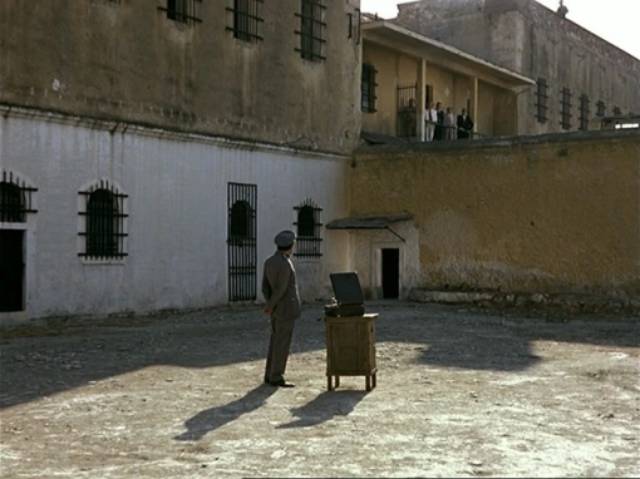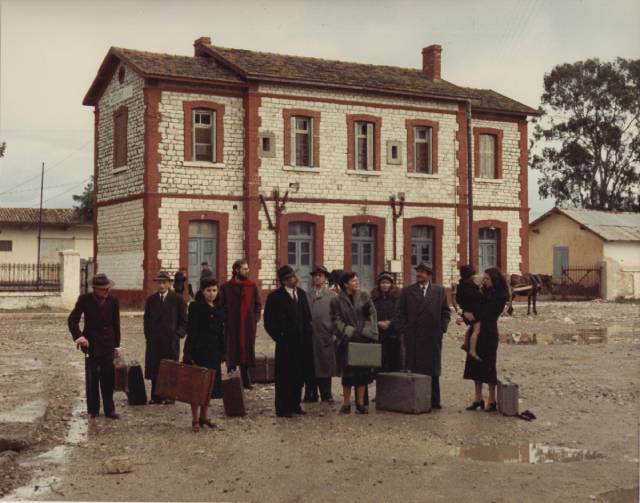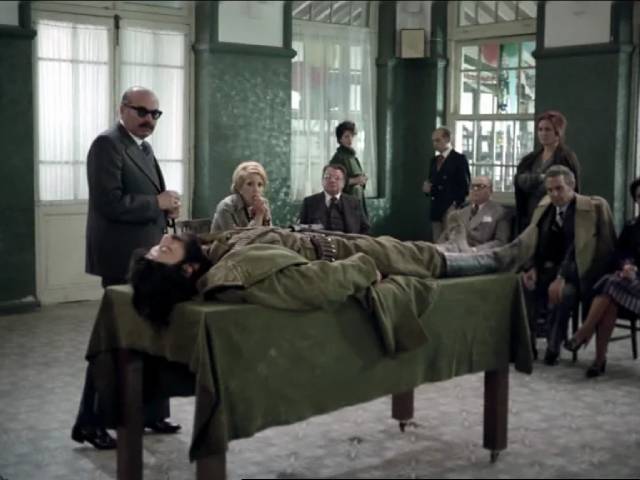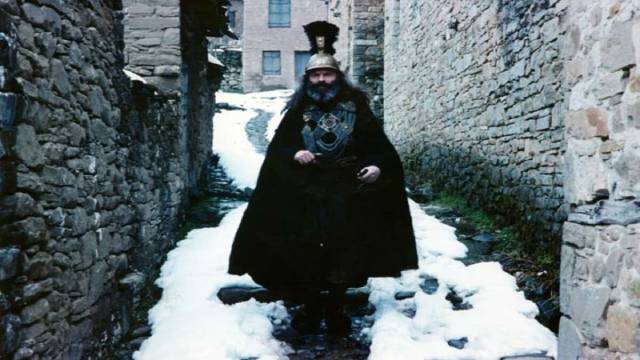The 5th Hong Kong International Film Festival, part ten
My final set of notes from the 1981 Hong Kong International Film Festival… and as always I haven’t edited these reviews in any way, although in some cases I might not agree with what I wrote back then.
10. GREECE

For me, the high point(s) of the festival (along with Syberberg’s epic) were the amazing films (four of them) of the Greek Marxist Theodoros Angelopoulos. One of the most vivid, original, superbly controlled directors I have ever come across. His effects are so finely honed that he can fill a film with ideas and events while presenting visually a minimum of action. These films are massive, dense, slow, and demanding – they work totally against the American concept of entertainment, yet they are thoroughly engrossing, and ultimately exciting. If you are capable of thinking while watching a film (many people aren’t), the films of Angelopoulos force you to become involved in the process of developing the ideas he’s working out on screen. At the same time startling you into admiration with the skill and audacity of his technique.
DAYS OF ’36, THE TRAVELLING PLAYERS, and THE HUNTSMEN are a trilogy presenting the progress(?) of Greek politics from the thirties to the present. The first (and shortest at less than two hours; the others all hover around four hours) takes a situation similar to that seen in Costa-Gavras’ Z; a prominent leftist is murdered at a rally and a petty criminal is set up to take the rap. Most of the film is concerned with this man’s taking of a hostage in prison, a member of parliament. The government is put in a precarious situation; if it gives in to his demands, it loses the support of one faction; if it stands firm, it loses the support of another. On top of which the attention the man is getting is extremely dangerous because he knows too much about the murder. His purpose in taking the hostage, in fact, is to save himself by telling what he knows to the public. And what he knows implicates high officials in the crime. The authorities have to tread a fine line between all these concerns, the hostage becoming more or less expendable as the prisoner’s silence becomes more imperative. That silence is finally secured by a sniper’s bullet.
This film was made at a time when such things could not be talked about openly in Greece; so Angelopoulos developed a style in which none of his main concerns were actually voiced aloud, oblique in the extreme. At first the film seemed empty, oddly static. But gradually what he is doing becomes clear. Almost all the action takes place off screen – he will stop with a guard outside a room where an important meeting is taking place and simply wait until the participants emerge – you then divine the content of the meeting from their attitudes, snippets of conversation, and where they go and what they do next. Dialogue is kept to a minimum, and events occur which seem arbitrary and meaningless until something else happens later on, reflecting back on it, enabling you to piece together what is going on off screen. The style seems sedate, static, yet you come to feel that there is a vast turmoil of events going on.

Angelopoulos is audacious in his use of long sustained takes (like waiting patiently in a corridor).; the camerawork is impeccable – the photography excellent, the choreography remarkable: he leads up to the sniper’s shot with a 720-degree pan around the dark prison compound, giving you glimpses of the guards preparing the moment, rushing about their activities as the camera passively moves at its own pace. This style might be described as ultrarealistic – or as bordering on the absurd, the surreal. Whatever, it works superbly in Angelopoulos’ assured, careful hands.
THE TRAVELLING PLAYERS is a much bigger, denser film than DAYS OF ’36. Where the earlier film virtually avoids all action, this second part of the trilogy is loaded with characters and incident. It follows the fortunes of a group of roaming actors through the late thirties and forties. The gradual disintegration of the group through personal and political tensions reflects the political life of Greece at the time; the Nazis move in, some collaborate, some resist, the war ends, the British reoccupy and back the old callaborationist fascists against the communist insurgents in a civil war, the rebellion is crushed….
Angelopoulos presents modern Greek history as a succession of fascist rulers, each ousted, giving rise to a new hope – only to have that hope dashed as the new rulers reveal themselves to be the same old fascists. But the film goes beyond political events to examine the historical decline of Greece as reflected in its culture. Most obviously, we see the great tradition of Greek tragedy reduced to what almost amounts to pathetic farce in the travelling performance of Golfo the Shepherdess. But beyond that, the players themselves reflect that tradition in their own lives: they play out the story of Agamemnon, Orestes, Electra…. The group’s original leader is betrayed to the Nazis by a fascist sympathizer within the troupe who is also the lover of the leader’s wife. The leader is killed, the wife and lover live together. Later on, the leader’s son kills them both, when he has become a communist partisan. His sister tries to hold the troupe together. But the nature of the new age is reflected in the story’s outcome: where in the original, Orestes finds a haven in Athens where justice is finally delivered, here he is captured and executed by the British supporters of the current regime. The golden age of justice and democracy has gone; fascism reigns. But the troupe, though changed, still survives – the spirit, battered though it may be, still exists.
As in all this director’s films, the camerawork, staging, acting are excellent. Again, his control is remarkable, moving effortlessly from comedy to horror, slipping back and forth in time within a single shot…. And there’s a superb moment in which art and limited budget are combined for an effect which is tense, funny, and thoroughly audacious: the troupe, having been stopped on the road, are lined up to be shot by the Germans in a reprisal action; the camera holds statically on them standing against a stone wall; suddenly there is shouting, shooting, explosions – all off screen; after a moment, a little confused, they slip silently away – yet Angelopoulos shows nothing of the partisan raid which saves them – and for that restraint the moment seems far more deeply felt; it’s their deliverance, arbitrary, unexpected, confusing, not the pyrotechnics, which are of primary importance. I can think of no other director who seems to know with quite such assurance just what it is necessary to show, and to have the skill to show only that, without embellishment.
As a final note, I might mention again Costa-Gavras, the only other political Greek director I know: although Angelopoulos does caricature the fascists, he never sets them up as comic cartoon-like creatures – as Costa-Gavras has a tendency to do. He knows that they’re too dangerous, must be taken seriously. Interestingly, the only Costa-Gavras film which comes really close to the seriousness, the density of Angelopoulos’ work, is his attack on Stalinist communism, THE CONFESSION – his antifascist films tend to be more like commercial thrillers, except for the oddly low-key SPECIAL SECTION.

Angelopoulos concludes his trilogy with THE HUNTSMEN, a massive, dense, exhausting film – more difficult than the others, but engrossing despite being the least accessible of the four works shown at the festival. I was glad that I’d already seen DAYS OF ’36 when I came to it – at least I had some kind of handle on his style; I was willing to be patient where I otherwise might have been thoroughly exasperated – and with this director, patience is more than rewarded.
On New Year’s Eve, 1977, a hunting party in the mountains discovers a body in the snow – a perfectly preserved partisan from the 1947 uprising, the blood in his wounds still fresh. They carry the body back to their lodge and hold a kind of inquiry, an inquest. Each character is revealed, group tensions surface. In their personal stories, the political history of post-war Greece unfolds: a series of risings of leftist spirit (democracy) and suppressions by the right (fascism). The members of the hunting party all belong to the right, the bourgeoisie, and their individual parts in the suppression of freedom are gradually exposed. The corpse, old yet fresh, is the symbol of the crushed leftist spirit – it might be knocked down but it won’t go away – it returns to haunt its oppressors. When the bourgeoisie have all been laid bare they are sentenced to die by a group of partisans, shot outside their lodge at sunrise – only to wake up bewildered, quickly taking the body back up into the mountains to bury it again in the snow. But of course they can’t get rid of the spirit of freedom that easily; the knowledge of its existence is always with them, they carry their guilt inside themselves, impossible to escape.
THE HUNTSMEN, in its surreal naturalism (if I can use such a phrase), reminded me quite a bit of Bunuel (particularly, of course, THE EXTERMINATING ANGEL) – but without Bunuel’s lightness of touch. There is some humour here, but no playfulness: early in the film there is a long, static shot of a hallway, with people occasionally going from room to room with accusations, getting angrier all the time – yet with long moments of no action at all and finally a cowardly little man trying to sneak away unnoticed, having to rush back to his room every time someone bursts out of one of the other rooms – it’s like something from a cartoon, or an old silent comedy – but it goes on so long, and is so deadpan, that for all that it becomes hilarious, a marvellous piece of absurdist comedy, it takes on a kind of awful desperation.
This is probably the most elaborate of the four Angelopoulos films in terms of staging and camera choreography. Some shots are of unbelievable complexity, sustained for five minutes or more, taking in whole town blocks with several different pieces of action running concurrently in different places. It also contains what must surely be the quintessential Angelopoulos shot: evening in the lodge, a dance on a past New Year’s Eve – a man reads a poem – a woman steps forward and begins to speak, going into a kind of trance, winding up on the floor for an autoerotic orgasm sustained at almost unbearable length – after which she is much applauded – the dance resumes, the camera weaving among the couples who gradually disappear, leaving only the members of the group on this New Year’s Eve, the hunting party – the doors burst open and a group of partisans from 1947 enter with guns levelled and order them all outside for execution…. All done in a single take.
Perhaps what is most important about Angelopoulos is the fact that, although a Marxist whose intentions are essentially polemical, he doesn’t do the usual thing, he doesn’t make his message simplistic – he weaves it into a multi-dimensional fabric of social and cultural consciousness, embodying it in a style of a rare kind – that which raises the technique of film to the level of art: a film can be art even if the technique is crude or mundane or unimaginative – if what it says is valuable enough in itself. Angelopoulos combines serious, highly developed ideas with a complex, highly developed style which both embodies and enhances those ideas, transcending polemic to become genuine art.

And finally, my personal vote for best film of the festival: Angelopoulos’ ALEXANDER THE GREAT. As dense as THE HUNTSMEN, as accessible as THE TRAVELLING PLAYERS, it’s his most straightforward exercise in narrative, but still highly complex in its themes and ideas. Around the turn of the century, a bandit chief escapes from prison with his followers. They kidnap a group of British tourists and demand amnesty for all their crimes. They return with their prisoners to their old mountain village – only to discover that, under the influence of a teacher, it has become an anarchist commune. The chieftain is at odds with the new order – a sense of property is prerequisite in his line of business. Conflict arises within the village; this, combined with the external pressure resulting from the presence of the hostages, starts to break the community apart. Backed by his men, Alexander becomes a military dictator ruling by force of arms. It seems that he is actually bent on destroying the village to revenge the killing of his bride years ago – and there are hints (in the shadowy prison break and after) that he has in fact been turned loose by someone to effect this destruction of a dangerous political phenomenon. Ultimately he kills the hostages and the village is overrun by soldiers. As an angry crowd surrounds him, intending to tear him apart, he literally vanishes from amongst them. As a character, he has been kept deliberately vague because he’s meant to stand as a symbol of all those elements, the darker side of man, which cause the ideal community to fail: greed, revenge, power, unreasoning emotion….
Threaded through the film, a minor narrative chord, is the story of a boy Alex, paralleling Alexander’s own early life, his vague origins as an orphan – and at the end the spirit of Alexander, that dark destructive force, passes into the boy to be carried on into the future (forming a kind of prologue to the conflicts seen in the trilogy, though this is the most recent of the films).
Angelopoulos gets some amusement out of a group of intellectual Italian anarchists who struggle to the village only to find themselves unable to cope with the real problems faced by the community; they give up in disgust and despair because this society doesn’t run according to the prescribed texts. Yet this is a part of what makes ALEXANDER, for all that it’s the most entertaining of the four films, the most despairing of them. Intellect can’t provide solutions; emotions are destructive – what are the chances of finding a lasting balance which will make the truly egalitarian society a working reality?
In terms of technique, there is less waiting in this film, fewer highly elaborate shots. It still moves slowly but there is more constant action and a greater emphasis on narrative – more “story” – than in the other films. The staging is as confident as ever and the photography superb.
And early in the film, Angelopoulos gives us what is perhaps his most stunning image, one of the most eloquent, beautifully realized moments I have ever encountered in a film: the English tourists, with their classical education, are contemptuous of the modern Greeks who have lost their past, don’t even speak the “true” Greek language any more. They go to witness the sunrise of the new century at an ancient temple. With their fine aesthetic sensibilities, they stand amongst the ruins and quote ancient poets on the beauty of the dawn. And suddenly draw back in fear and uncertainty as a figure slowly rises before them, Alexander on his horse in tunic and helmet, straight out of the past, carrying with him all the raw energies their bourgeois education has washed out of history, confronting them with a political reality they had ignored as being too coarse, beneath them – and which will ultimately destroy these connoisseurs of an unreal, romanticized past. A moment so perfectly conceived and executed that it can leave no doubt that Angelopoulos is one of the greatest artists of modern film. I would rank him with Tarkovsky.
Comments